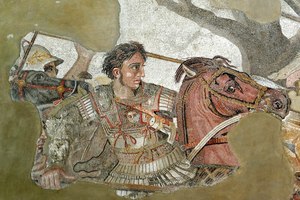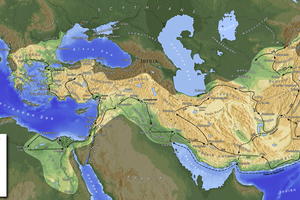Military Campaigns of Alexander the Great
Alexander the Great is one of the most charismatic and renowned figures of the Ancient world. He came to power at the young age of 20. As a result of Alexander the Great's campaign to the East, a new powerful state emerged, stretching from the Aegean Sea to the Indus River basin and from the Libyan desert to the Caspian Sea.
Background
By the turn of the 5th and 4th centuries BCE, it became evident that the main enemy of the Greek city-states, the Persian Empire, had significantly weakened, creating favorable conditions for conquests:
- The Greeks desired revenge against the Persians for the desecration of their sanctuaries during the Greco-Persian Wars.
- The Greeks dreamt of uniting all their city-states into a single entity to resist the "barbarians."
- Alexander of Macedon managed to unite Greece and establish the Corinthian League in 338-337 BCE under the leadership of Macedonia.
- The Persian Empire was engulfed in internal conflicts, and despite its large army of around 270,000 soldiers, it was much weaker than the Macedonian forces in terms of training and tactical capabilities.
Before embarking on the campaign, Alexander the Great had only 28,000 infantry and 4,700 cavalry. He was essentially taking a gamble, as his army had provisions for only a month.
Objectives of the campaign:
- To free the Aegean Sea from Persian ships.
- To deprive Persia of all military bases in Asia Minor.
- To liberate the Greek city-states and make them military allies.
Alexander the Macedonian's Military Campaign in the East
Alexander the Great faced Persian King Darius III, a timid and indecisive ruler who made a series of strategic mistakes that ultimately led to his downfall. The Persian army consisted mainly of cavalry, and Darius' attempts to create a regular infantry force were unsuccessful. The infantry consisted of mercenaries and could not offer significant resistance to the Macedonians.
Chronology of events:
- Battle of Granicus (May 334 BCE): Alexander decisively triumphs, and Greek cities in southern Persia willingly join his side.
- Battle of Issus (333 BCE): The Persians suffer a devastating defeat. All of Asia Minor comes under Alexander the Macedonian's control.
- The Persians gradually withdraw from Syria and Phoenicia. Satrap Sabaces of Egypt falls in battle at Issus, and the new governor surrenders Egypt without resistance.
- Battle of Gaugamela (October 1, 331 BCE): While Alexander gives his army rest and consolidates the conquered territories, Darius III amasses forces for a strike against the Macedonians. The decisive battle takes place near the village of Gaugamela. After Darius' defeat, the Persian Empire ceases to exist as a state.
- Under the leadership of Alexander the Great, the troops proceed further south to Babylon. Babylon surrenders without a fight. Elam and Persis fall in the southeast.
- In 330 BCE, near the modern-day Iranian city of Nastans, Darius III is treacherously assassinated by his satraps led by Bessus. Alexander orders the execution of the traitor. The Achaemenid Empire ceases to exist legally.
- Military operations shifted to the outskirts of the former Persian Empire. For three years, Alexander ruthlessly suppressed local uprisings. Military fortresses were built by the Macedonians to signify their military presence, which later evolved into cities.
- In the spring of 327 BCE, Alexander the Great organized a campaign into India. Initially, things went well for the Macedonians as they took advantage of the internal strife between Indian rajahs and swiftly occupied Northwestern India. However, as the Macedonian army advanced further into the country, they faced increasing resistance from Indian forces. In a fierce battle in 326 BCE on the Hydaspes River against Indian King Porus and his army, the Greeks suffered significant losses. The onset of the monsoon season led to the spread of viral diseases, and rumors spread of a large Indian army with hundreds of war elephants marching towards the Macedonians. These factors compelled Alexander to abandon the continuation of the campaign.
After Alexander the Great's eastern campaign concluded, rebellions erupted on the borders of the empire. Following Alexander's sudden demise, the vast empire he had created rapidly crumbled. He had not left behind a designated heir, and a struggle for power ensued among his former comrades.
Related topics
Alexander the Great, Ancient Greece, Macedonia, Macedonian Wars




